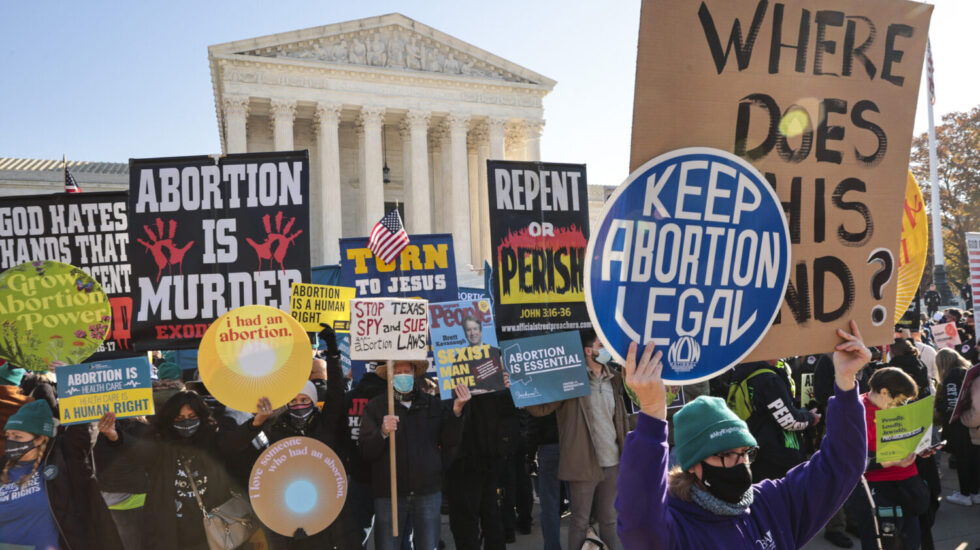The Supreme Court on Wednesday signaled a willingness to overturn abortion rights first codified in 1973’s Roe v. Wade and reaffirmed in 1992’s Planned Parenthood v. Casey.
Because of those two precedents, states cannot ban abortion before fetal viability, which occurs approximately 24 weeks into pregnancy. But a 2018 Mississippi law attempted to prohibit the procedure after 15 weeks. That law was struck down by a lower court. The Supreme Court agreed to hear an appeal. The case is titled Dobbs v. Jackson Women’s Health Organization.
During oral arguments, members of the court’s six-member conservative majority seemed to favor the arguments presented by the Mississippi Solicitor General, Scott G. Stewart, who said the existing precedents on abortion “haunt our country” and “have no home in our history or traditions.”
Justice Samuel Alito said the viability line “really doesn’t make any sense.” Chief Justice John Roberts – viewed as a key swing vote – seemed to echo Alito’s point, asking lawyers “Why is 15 weeks not enough time?”
Justice Bret Kavanaugh expressed an inclination to bring the court “to the position of neutrality.”
“Why should this court be the arbiter rather than Congress, the state legislatures, state supreme courts, the people being able to resolve this?” Kavanaugh asked Elizabeth Prelogar, the U.S. Solicitor General, who was representing an abortion clinic that challenged the Mississippi law.
Prelogar responded that the court “correctly recognized that this is a fundamental right of women and the nature of fundamental rights is that it’s not left up to state legislatures to decide whether to honor them or not.”
“The real world effects of overruling Roe and Casey would be severe and swift,” Prelogar added earlier. “If this court renounces the liberty interest recognized in Roe and reaffirmed in Casey, it would be an unprecedented contraction of individual rights.”
But Justice Amy Coney Barrett suggested that giving up a child for adoption could be an alternative to abortion.
Two other conservatives on the bench – Justices Clarence Thomas and Neil Gorsuch – are widely viewed as staunch opponents of abortion. Thomas has openly advocated for overturning Roe.
The court’s three liberal members argued that overturning longstanding precedent would imperil the court’s reputation for political neutrality.
“Will this institution survive the stench that this creates in the public perception that the Constitution and its reading are just political acts?” Justice Sonia Sotomayor asked, later adding: “If people actually believe that it’s all political how will we survive? How will the court survive?”
Justice Stephen G. Breyer picked up on that sentiment, explaining that the court must resist “social pressure [or] political pressure.”
“To overrule under fire in the absence of the most compelling reason to examine a watershed decision would subvert the court’s legitimacy beyond any serious question,” Breyer said.
It’s possible that the court limits abortion rights without banning the procedure all together. The Washington Post reports:
It does seem like there’s an option for a compromise, though: to let Roe v. Wade stand, protecting a woman’s right to abortion, but to allow states to ban abortion earlier — perhaps months before the current standard of when a fetus is deemed viable to live outside the womb. “Why would 15 weeks be an appropriate line?” asked Chief Justice John Roberts.
“Roberts indicated he may be open to a middle approach,” said Lisa Soronen, executive director of the State and Local Legal Center, which supports states and local governments in cases before the Supreme Court.
Justice Neil M. Gorsuch also asked about a potential middle ground to let abortion protections stand but let states ban it earlier.
The Associated Press provides key context:
More than 90% of abortions are performed in the first 13 weeks of pregnancy, well before viability, according to the federal Centers for Disease Control and Prevention.
Only about 100 patients per year get abortions after 15 weeks at the Jackson Women’s Health Organization, Mississippi’s lone abortion clinic. The facility does not provide abortions after 16 weeks.
But the clinic argues that the court doesn’t normally assess constitutional rights based on how few people are affected, and that the justices shouldn’t do so in this case.
A ruling is expected next year, in the months leading up to the 2022 midterm elections.



